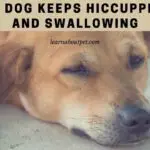Dog throat spasms can cause a great deal of worry to canine owners. Often, they are spectacular. An episode will usually start with the dog suddenly standing still. He will then stretch his neck as well as his front legs as far as they can move. Thereafter, the dog’s chest will start moving rapidly: sometimes at a dizzying pace… This is the sort of thing that can be very discomfiting to a dog owner. It can be particularly worrisome if it is happening for the first time.
Thankfully, throat spasms in dogs are not always due to serious underlying medical issues. Many times, what manifests as a ‘throat spasm’ in a dog simply turns out to be reverse sneezing. Other times, there may be something irritating your dog’s throat, causing him to act as if he is having spasms. Then there are cases where the dog has digestive tract problems. Those then make him behave as if he is having spasms.
Dog throat spasms will cause some discomfort to your dog with no long term issues. For minor or infrequent throat spasms in dogs, you shouldn’t be too worried. But when dog throat spasms become too frequent, it is important to seek veterinary advice.
The same applies if the dog appears too distressed while having the spasms: consult the vet. If the spasms are accompanied by other symptoms like severe coughing, vet advice is necessary.

What is Wrong With My Dogs Throat?
There are several things that could be wrong with your dog’s throat, if he is having spasms. It could be a minor case of irritation in the dog’s throat. It could be a more complex case of the windpipe/trachea in your dog’s throat collapsing.
Where the problem is irritation, it may be due to something the dog has eaten. Or it could be due to injury: given that apparent spams are among the key dog throat injury symptoms. It could even be due to something stuck in the dog’s throat. Stuck foreign objects do sometimes cause throat spasms symptoms in dogs.
More commonly, it could also be a simple case of reverse sneezing. The reverse sneezing dog condition is actually the major cause of throat spasm in dogs species.
The actual problem that is causing dog throat spasms may, however, not be within the throat per se. For instance, the dog throat spasms could be due to an acid reflux problem. So you have acid ‘climbing up’ from the stomach to the throat area: with its irritation causing apparent spasms.
Or the apparent dog throat spasms may be a local problem within the esophagus. That is, for instance, the case with esophagitis (which can in turn be related to the acid reflux). The dog throat spasms could even be due to the dog’s heart: as for instance, in congestive heart disease.
A vet’s examination can tell whether the dog throat spasms are actually due to dog throat problems. Or if the dog throat spasms are due to problems elsewhere. ‘Elsewhere’ in this case could be in the esophagus, further down in the gastro-intestinal tract or in the heart.
What Causes Throat Spasms in Dogs?
Real throat spams in dogs are usually due to reverse sneezing. What happens here is a brief movement within the dog’s throat-mouth junction. Due to this movement, the windpipe constricts briefly, causing inhalation difficulties. It is this struggle to inhale, during that brief period, which manifests as whole throat spasm.
Throat spasms in dogs could also be due to acid reflux. This type of spasms is more common after the dog has eaten.
Then there are the cases where the (apparent) throat spasms in dogs are due to throat irritation. The irritation may be of a physical nature – say, due to something stuck in the throat. Or it may be of a chemical nature—for instance due to an allergen the dog has been exposed to.
Of course, dog throat spams could also be due to a much more ominous condition. For instance, congestive heart failure can manifest through apparent dog throat spasms.
You have to look at the other symptoms accompanying the dog throat spasms. Only then would you get a better idea of what exactly is causing them.
Dog Throat Spasms Symptoms
When a dog is having a spasm, he will usually stretch his neck and front legs, while standing still. Then he starts moving his chest rapidly, while perhaps making noise like something is stuck in the throat. The latter bit – of dog making noise like something stuck throat – is very noticeable. It is often that noise which alerts the owner/caregiver to the spasm incident.
The dog throat spasm could be a symptom of reverse sneezing: especially where the spasms appear alone (without other symptoms). It could also be a symptom of throat irritation or gastro-intestinal issues. That may be the case if there are dog throat spasms and eating grass simultaneously.
At another level, it could be a symptom of congestive heart failure. That may be the case if, for instance, the spasms are accompanied by very severe coughing and distress.
Can Dogs Have Esophageal Spasms?
Yes, it is possible for dogs to have esophageal spasms. These are typically due to conditions like esophagitis. The dog esophagus spasms are very easily mistaken for (purely) throat spasms. Indeed, the dog esophagus spasms manifest in the throat area, though they are caused by problems further down.
Does My Dog Have Something Stuck in His Throat?
One of reasons why you are seeing dog throat spasms could be due to something stuck in Fido’s throat. The spasms are sometimes due to dog throat problems arising following throat irritation: due to objects stuck in the throat.
There is only one sure way to rule out the possibility of something being stuck in the dog’s throat. That is by having the vet check. You have more reason to suspect this issue if, for instance, you have noticed the dog throat swollen.
The vet may coax the dog into opening his mouth. Then using a certain tool, he illuminates the throat. He is then able to see whether or not there is something stuck in there.
Checking whether something is stuck in your dog’s throat is best done by a vet. If you attempt to do it at home, you run the risk of getting bitten by the dog. Even the least aggressive of dogs can suddenly become very hostile during throat examination. There is a method that needs to be followed, if dog throat examination is to proceed safely. That is why it is a good idea to have the vet do it for you.
Furthermore, while attempting to check if something is stuck in your dog’s throat at home, you could end up missing. That is because you may not know what to look for. So you could assume that nothing is stuck there while, in fact, there is a foreign object in there. And if you do find something stuck in there, what would you do about it anyway? Wouldn’t you still need the vet’s help to remove it? That is why the whole affair is best left to a vet.

How Do I Know if My Dog Has Difficulty Swallowing?
If, for instance, the dog is unable to swallow at first attempt, it could be a sign. So you would be having a situation where the dog has to make multiple attempts to swallow. You can check against a baseline. Like if previously, your dog has been able to swallow a certain type of food effortless, at first attempt. But now he is having to make several attempts before finally downing the same food. So this would indicate difficult swallowing.
Other signs include the dog ending up with too much food in its cheeks, or the dog regurgitating its food. Gagging can also be an obvious sign of dog having difficulty swallowing.
There are also cases where you see the dog grimacing while attempting to swallow food. So you know that swallowing has become painful for the dog: an indication of difficulty.
Difficulty swallowing could also make the dog look as if he is having spasms. Thus, some apparent throat spasms in dogs are simply due to swallowing difficulties.
| Possible Causes of Dog Throat Spasms | · Reverse sneezing · Throat irritation · Acid reflux · Congestive heart disease (rarer) |
What Can I Feed My Dog With Esophagitis?
You need to mostly restrict your dog to soft foods. This is especially necessary if you have been seeing dog throat spasms due to esophagitis. The worst thing you can do to a dog suffering from esophagitis is give him very hard food. And that includes food that is high in fiber. It is to be avoided. Therefore for the duration that your dog is recovering from esophagitis, he needs to be only fed on soft foods.
In fact, for very severe esophagitis (which is treated on inpatient basis), the dog is deprived of all solid food. During that period, the dog is only fed intravenously.
Your dog’s esophagitis may not be at that level. It may not have gotten to the point where the dog has to be fed intravenously. But you should nonetheless restrict the dog to soft foods until the esophagus heals substantially. This may be a viable approach in the treatment of certain dog esophagus spasms.
Try to minimize the amounts of fats and protein the dog eats while recovering from esophagitis. Give more carbohydrates. And avoid foods that are likely to contain allergens. Certain allergens inevitably cause dog throat spasms: especially in dogs with esophagitis.
How Do You Treat Esophageal Spasms in Dogs?
The ideal treatment for dog esophageal spasms will depend on what is causing them: the root cause. There are cases where you may need to use certain medications. There are other cases where you may need to do diet modification for the dog. Then there are cases where you need to have the dog undergo corrective procedures.
How Can I Soothe My Dog’s Throat?
Massaging the dog’s throat softly can help in some cases. This seems to work in some cases if my dog is having breathing spasms due to sore throat. You can also try natural remedies, like honey (just a little bit of it). There are also medications you can give to your dog to sooth his throat.
What to Do If Dog Swallows Repeatedly
If dog swallows repeatedly, it may be a good idea to take him to the vet. The cause of the dog swallowing repeatedly may be acid reflux. The swallowing may progress to spasms if you ignore the underlying reflux problem. The dog could also be swallowing repeatedly because he is nauseous. Either way, it could be serious: hence the need to consult a vet.
How to Prevent Dog Throat Spasms in the Future
It is a good idea to ensure that you don’t use very tight leashes. That is because a very tight leash sometimes causes reverse sneezing – and the consequent throat spasms symptoms in dogs.
Avoid giving the dog foods that are likely to cause acid reflux. That is because, as we saw, acid reflux is one of the leading dog esophageal spasm causes.
Modify your dog’s diet and lifestyle, to maintain a healthy weight. That will address issues like tracheal collapse. The latter is a common cause of bad spasms in dogs. It is most frequently seen in dogs with unhealthy weights.
Avoid using very strong perfumes and other likely allergens around your dog.
Do all you can to keep your dog from injuring his throat. Keep items that are likely to injure his throat out of his reach.
Try to control mites: as the presence of mites can sometimes cause irritation and hence spasms in dogs.
Final Verdict
In most cases, dog throat spasms shouldn’t be cause for too much concern. That is unless they are too frequently, are too serious or are accompanied by other distressing symptoms.

Even where throat spasms in dogs are due to serious underlying medical conditions, the latter are usually treatable. Sometimes, treatment is just a matter of giving the dog certain simple medications.
At other times, dog throat spasms treatment entails complex procedures. In almost all cases though, the outlook tends to be good.
Other Dog Sickness related articles you may want to know about

Welcome to Learn About Pet. My name is Rajkumar Ravichandran and I love all pets, travel, and amazing food. I write about my passion and personal experience caring for multiple pets in this blog! ❤️
Post Disclaimer
DISCLAIMER: THIS BLOG OR WEBSITE, "Learn About Pet", DOES NOT PROVIDE YOU WITH MEDICAL ADVICE AND IS NOT A SUBSTITUTE FOR MEDICAL ADVICE. ALWAYS GET IN TOUCH WITH YOUR PERSONAL VETERINARIAN AND USE INFORMATION HERE AS GENERAL ADVICE.
The information, including but not limited to, text, graphics, images and other material contained on this website are for informational purposes only. No material on this site is intended to be a substitute for professional veterinary advice, food recommendation, diagnosis, or treatment. Always seek the advice of your veterinarian or other qualified health care provider with any questions you may have regarding a medical condition or for pet food related questions.







